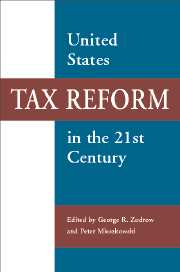Book contents
- Frontmatter
- Contents
- List of Contributors
- Preface
- 1 Introduction: The Fundamental Question in Fundamental Tax Reform
- 2 Behavioral Responses to a Consumption Tax
- 3 The Economic Impact of Fundamental Tax Reform
- 4 Capital Income Taxation in Tax Reform: Implications for Analysis of Distribution and Efficiency
- 5 International Aspects of Fundamental Tax Reform
- 6 Distributive Analysis of Fundamental Tax Reform
- 7 The Role of Administrative Issues in Tax Reform: Simplicity, Compliance, and Administration
- 8 Evaluating the National Retail Sales Tax from a VAT Perspective
- 9 Transitional Issues in the Implementation of a Flat Tax or a National Retail Sales Tax
- 10 Historical and Contemporary Debate on Consumption Taxes
- 11 The Politics and Ideology of Fundamental Tax Reform
- Bibliography
- Index
7 - The Role of Administrative Issues in Tax Reform: Simplicity, Compliance, and Administration
Published online by Cambridge University Press: 23 October 2009
- Frontmatter
- Contents
- List of Contributors
- Preface
- 1 Introduction: The Fundamental Question in Fundamental Tax Reform
- 2 Behavioral Responses to a Consumption Tax
- 3 The Economic Impact of Fundamental Tax Reform
- 4 Capital Income Taxation in Tax Reform: Implications for Analysis of Distribution and Efficiency
- 5 International Aspects of Fundamental Tax Reform
- 6 Distributive Analysis of Fundamental Tax Reform
- 7 The Role of Administrative Issues in Tax Reform: Simplicity, Compliance, and Administration
- 8 Evaluating the National Retail Sales Tax from a VAT Perspective
- 9 Transitional Issues in the Implementation of a Flat Tax or a National Retail Sales Tax
- 10 Historical and Contemporary Debate on Consumption Taxes
- 11 The Politics and Ideology of Fundamental Tax Reform
- Bibliography
- Index
Summary
The basic administrative goals of tax policy are uncontroversial: taxes should be easy to understand and comply with, and they should be enforced and administered in a competent and fair manner. Despite nearly universal agreement on these goals, administrative concerns raise difficult issues for researchers and policy makers. Researchers have not reached consensus regarding many of the most basic questions about the existing tax system, such as the costs of compliance and the determinants of tax evasion. Even when research does produce reliable answers to these questions, policy makers face difficult trade-offs both among various administrative goals and between administrative goals and other widely held goals of tax policy, such as equity and efficiency.
Administrative issues have also been in the forefront of efforts to reform taxes in recent years. Perhaps the most common complaint about the existing tax system is the level of complexity. The nature of activities undertaken by the Internal Revenue Service has also proved highly controversial. The desire to address these issues generates much of the impetus for fundamental tax reform – replacing the current system with either the flat tax or a national retail sales tax.
This chapter examines the role of administrative factors in tax policy and tax reform. After summarizing conceptual and measurement issues relating to tax complexity and tax evasion, we explore why complexity and evasion continue to exist.
- Type
- Chapter
- Information
- United States Tax Reform in the 21st Century , pp. 179 - 214Publisher: Cambridge University PressPrint publication year: 2002
- 3
- Cited by



